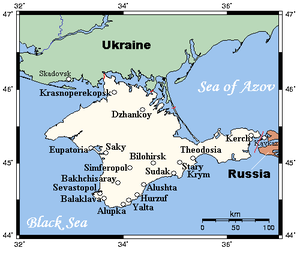The Russian government has reported an incident in which two Russian officials, a soldier and a member of the FSB security service, were killed breaking up an attempted incursion by what they described as a Ukrainian spy network operating in the Crimean Peninsula.
 Russian President Vladimir Putin accused the Ukrainian government of being behind the plot, aiming to provoke a new conflict to distract the Ukrainian public from its myriad problems, adding that in breaking up the network they’d foiled potential terror attacks against critical infrastructure inside Crimea.
Russian President Vladimir Putin accused the Ukrainian government of being behind the plot, aiming to provoke a new conflict to distract the Ukrainian public from its myriad problems, adding that in breaking up the network they’d foiled potential terror attacks against critical infrastructure inside Crimea.
Crimea has a complicated history of ownership. Initially annexed into the Russian empire in 1783, after a brief period as an independent Khanate. With the formation of the Soviet Union, it became its own Soviet Socialist Republic until the end of World War 2, at which point it was downgraded to an Oblast, which was part of the Russian SSR.
In 1954 it was transferred to the Ukrainian SSR, again within the Soviet Union, where it remained until 1992, when Ukraine declared independence and Crimea because an autonomous region within Ukraine. In 2014, a revolution within Ukraine ousted the pro-Russian government, leading Crimea to secede from Ukraine and immediately seek and gain accession into the Russian Federation.
Crimea is considered extremely important to Russia as the city of Sevastopol is the home of their Black Sea Fleet, and indeed has been that fleet’s home since 1783. In the waning years of Crimea’s 22 years as part of independent Ukraine, Russia had considered moving the fleet to the port of Novorossiysk, but never did so. Ukraine does not recognize Russia’s ownership of Crimea, and treats it as a “military occupation,” though in practice the Russian troops in the peninsula are largely the same ones who were there with the fleet all along.
Ukraine denied the claims outright, not only insisting that they had nothing to do with the attempted incursions across the Ukraine/Crimea border, but insisting that such incidents didn’t happen at all. This is likely to fuel a new round of NATO predictions of an imminent Russian invasion of Eastern Europe, as indeed does any news about Russia being involved in anything in Eastern Europe.
Sabotage against the Crimean Peninsula would not be unheard of, as over the past year saboteurs twice knocked out electricity to large portions of the peninsula with attacks on pylons within Ukraine’s bordering Kherson Oblast. Ukrainian nationalist movements also prevented repairs for months on end by threatening repair crews, leaving the peninsula in darkness as Russia scrambles to get its own infrastructure in place. An undersea Russian cable run is expected to be finished by 2020, and Russia is also constructing a massive bridge to Crimea, which would give it a land connection not requiring travel through southeastern Ukraine. That bridge is to be done by the end of 2018.


